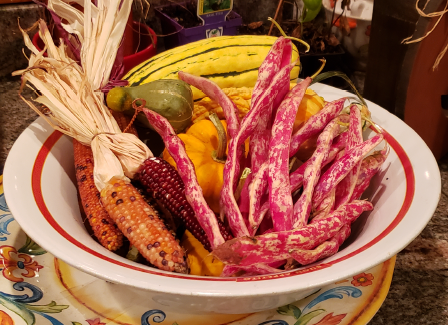Pumpkins are everywhere at this time of year. You may have already enjoyed carving a scary face into your jack-o-lantern or baking a homemade pumpkin pie in anticipation of All Hallows Eve. But pumpkins also contain important nutrients that can support your health all year long.
In fact, a brand new study has found that pumpkin seed extract can improve symptoms of a common prostate problem suffered by up to 80 to 90 percent of men as they get older.
But before I get into those important benefits, let’s talk a little about the history of pumpkins…
Pumpkins also come from the Americas
The word “pumpkin” comes from the Greek word pepon, which means large melon. But pumpkins actually belong to the Cucurbitaceae family of plants, along with cucumber, squash, and zucchini.
Just like chocolate, peppers, beans, squash, and gourds, pumpkins originated in the Americas. In fact, its seeds have been found dating back thousands of years in Mesoamerica (modern-day Mexico).
We know Native Americans planted pumpkins (and other squash) in rows, together with corn and beans, and called them, “The Three Sisters.”

The cornstalks grew tall, providing stalks for the beans to climb. Meanwhile, the pumpkin (and squash) vines grew in the shade along the ground, keeping out weeds. Then, by the time the pumpkins got big enough to grow out from under the shade of the leaves, the weather had cooled and the heat could no longer damage them. (Pumpkins actually prefer shade, which is why it’s always a bit disappointing when I see acres of pumpkins planted out in the open sunshine today.)
We also know that Native Americans used all parts of the pumpkin to sustain them through the cold winter months. Which makes sense, as pumpkin seeds, specifically, are high in protein, linoleic acid (an essential fatty acid), and bioavailable minerals. And pumpkin flesh contains lots of natural beta-carotene, an antioxidant and metabolic precursor of vitamin A, as well as other vitamin and mineral micronutrients. (I checked the carotenoid content of pumpkins myself with colleagues at the USDA back in 1984.)
Later, European settlers in North America quickly learned about and used pumpkins as well. In fact, it’s said that Europeans made the first pumpkin “pie” by removing the seeds and filling the shell with cream, eggs, honey, and spices. Then, they buried it in the hot coals of a fire to bake.
Pumpkin also has a long history of use in traditional medicine. And natural health practitioners today still use it to treat rheumatism, swelling, urinary conditions, and intestinal parasites.
Modern science is beginning to show that pumpkin and pumpkin seed extracts and oils have anti-cancer, anti-diabetic, anti-inflammatory, and antimicrobial properties. Which brings us to the new study I mentioned at the beginning of this Dispatch…
Pumpkin seeds help with BPH
In a brand new study from Austria, researchers wanted to see if dietary supplementation with pumpkin seed extract could help alleviate symptoms of benign prostatic hypertrophy (BPH), a non-cancerous enlargement of the prostate gland that affects up to half of men between the ages of 51 and 60 years and up to 90 percent of men 80 years and older.
Researchers gave 60 men with “moderate” or “severe” BPH symptoms 500 mg daily of pumpkin seed extract.
Then, after just four weeks, the men experienced a significant 30 percent improvement in BPH symptoms. Specifically, the men experienced reductions in the frequency and urge to urinate during the night. In addition, they experienced a significant reduction in retention of urine in the bladder.
So—this week, as you carve your jack-o-lantern, consider cooking the flesh to use for your own homemade pie filling. And definitely roast the seeds as a great, tasty, prostate-healthy snack. After all, they provide a natural source of essential fatty acids and minerals!
If you’ve never roasted your own pumpkin seeds before, don’t worry—it’s easy to do. Clean off the pulp, dry the seeds out on a paper towel, toss with olive oil and salt, then roast in the oven at 325°F for 10 minutes. Crack the dried, roasted seeds, extract the inner soft seed, and enjoy! Or go ahead and eat the well-done pumpkin seeds whole, along with the shell, after you’ve roasted them to perfection—you’ll get the extra fiber. It’s really up to you!
And before I go, you can learn about many more natural ways to prevent—and even reverse—prostate disease in my new comprehensive, science-backed Insider’s Ultimate Guide to Perfect Prostate Health. To sign up or learn more about this innovative learning protocol, click here now!
Source:
“Effects of an Oil-Free Hydroethanolic Pumpkin Seed Extract on Symptom Frequency and Severity in Men with Benign Prostatic Hyperplasia: A Pilot Study in Humans.” Journal of Medicinal Food, 2019. 22(6). doi.org/10.1089/jmf.2018.0106
